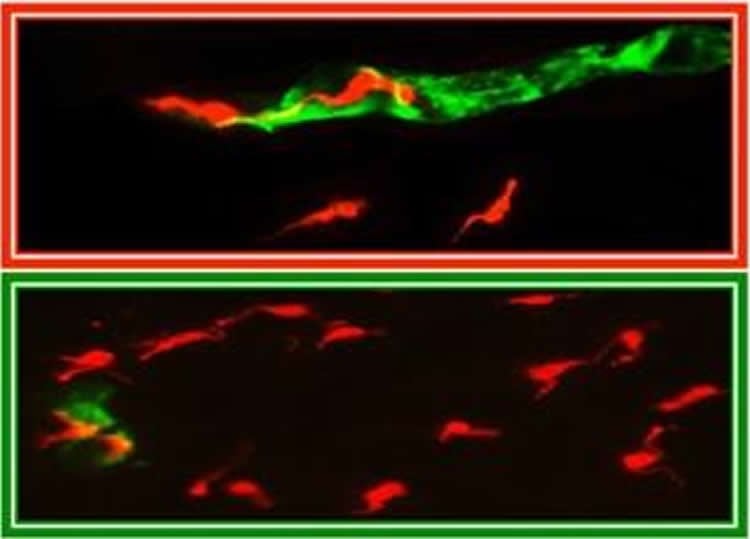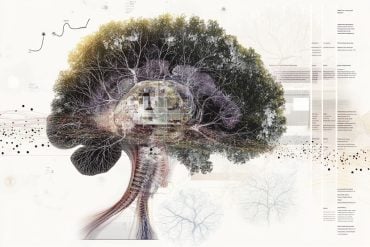African trypanosomiasis is called ‘sleeping sickness’ because when the infection is untreated, trypanosome parasites will invade the brain and cause disruption of sleeping patterns and irreversible neurological damage. A study published on February 25th in PLOS Pathogens reports that in a mouse model of trypanosome disease, nitric oxide (NO) plays an unexpected role in preserving the integrity of the blood brain barrier (BBB), thereby reducing parasite invasion into the brain, and likely limiting neurological damage.
NO is generally thought to be a pro-inflammatory signal, promoting a strong immune response against pathogens. The resulting inflammation is a mixed blessing: on one hand, it helps to control potentially dangerous pathogens, but on the other, it can cause “collateral damage” to the inflamed tissue.
Martin Rottenberg and colleagues, from the Karolinska Institute in Stockholm, Sweden, are interested in how trypanosome parasites cause disease and in the host immune defense against them. In this study, they examine the role of NO in a mouse model of trypanosomiasis, with a focus on how the parasites manage to get through the so-called blood brain barrier (BBB), the border surrounding the mammalian brain that is normally impenetrable to foreign intruders as well as most host cells.
To their surprise, they found that when they infected mice that lack an enzyme called iNOS, which produces NO in response to an infection, with trypanosomes, the mutant mice had elevated numbers of parasites and host immune cells in the brain. The cause, they determined, was an increased permeability of the blood vessels that are part of the BBB.
When the researchers looked at iNOS levels in response to trypanosome infection in normal mice, they found that infection is followed by an increase in iNOS levels in immune cells called macrophages in and near the brain, which in turn produces more local NO. Examining the underlying mechanisms, the researchers found that a molecule called TNF mediates the increased permeability to proteins, leukocytes and parasites in the brain of mice lacking iNOS. NO inhibited both TNF production by macrophages and its inflammatory function.
TNF itself, they could show, acts through a molecule called MMP-9 whose function is known to affect cell motility and tissue invasion. Consistent with a key role of MMP-9, the researchers found that minocycline, an antibiotic drug related to tetracycline, can restore the function of the BBB in mice lacking iNOS, and reduce the numbers of parasites and host inflammatory cells in their brains.

“In the present study”, the researchers summarize, “we describe a protective, anti-inflammatory role of NO in the pathogenesis of an experimental neuroinflammatory disease, i.e. African trypanosomiasis. In particular, iNOS produced NO was critical for maintaining the integrity of the BBB, hampering continuous brain invasion of parasites and leukocytes. This was unexpected, since release of iNOS-derived NO into the brain often has been associated with toxicity both of the BBB and the nervous tissue.”
Funding: This study was supported by grants from the Swedish Research Council, EuroNet-Neuron program, 2014-16/529-2014-7552/ERA-Net Neuron and the Karolinska Institutet. The funders had no role in study design, data collection and analysis, decision to publish, or preparation of the manuscript.
Competing Interests: The authors have declared that no competing interests exist.
Source: Martin Rottenberg – PLOS
Image Source: The image is credited to Olivera et al..
Original Research: Full open access research for “Nitric Oxide Protects against Infection-Induced Neuroinflammation by Preserving the Stability of the Blood-Brain Barrier” by Gabriela C. Olivera, Xiaoyuan Ren, Suman K. Vodnala, Jun Lu, Lucia Coppo, Chaniya Leepiyasakulchai, Arne Holmgren, Krister Kristensson, and Martin E. Rottenberg in PLOS Pathogens. Published online February 25 2016 doi:10.1371/journal.ppat.1005442
Abstract
Nitric Oxide Protects against Infection-Induced Neuroinflammation by Preserving the Stability of the Blood-Brain Barrier
Nitric oxide (NO) generated by inducible NO synthase (iNOS) is critical for defense against intracellular pathogens but may mediate inflammatory tissue damage. To elucidate the role of iNOS in neuroinflammation, infections with encephalitogenic Trypanosoma brucei parasites were compared in inos-/- and wild-type mice. Inos-/- mice showed enhanced brain invasion by parasites and T cells, and elevated protein permeability of cerebral vessels, but similar parasitemia levels. Trypanosome infection stimulated T cell- and TNF-mediated iNOS expression in perivascular macrophages. NO nitrosylated and inactivated pro-inflammatory molecules such as NF-κΒp65, and reduced TNF expression and signalling. iNOS-derived NO hampered both TNF- and T cell-mediated parasite brain invasion. In inos-/- mice, TNF stimulated MMP, including MMP9 activity that increased cerebral vessel permeability. Thus, iNOS-generated NO by perivascular macrophages, strategically located at sites of leukocyte brain penetration, can serve as a negative feed-back regulator that prevents unlimited influx of inflammatory cells by restoring the integrity of the blood-brain barrier.
“Nitric Oxide Protects against Infection-Induced Neuroinflammation by Preserving the Stability of the Blood-Brain Barrier” by Gabriela C. Olivera, Xiaoyuan Ren, Suman K. Vodnala, Jun Lu, Lucia Coppo, Chaniya Leepiyasakulchai, Arne Holmgren, Krister Kristensson, and Martin E. Rottenberg in PLOS Pathogens. Published online February 25 2016 doi:10.1371/journal.ppat.1005442







